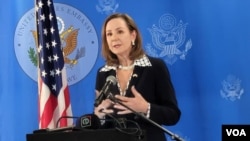HARARE (Reuters) – The United States wants to see key reforms before rejoining debt resolution talks between Zimbabwe and multilateral lenders from which Washington withdrew following the African country’s disputed 2023 election.
The new U.S ambassador to Zimbabwe, Pamela Tremont, hinted that there are prospects for Washington to rejoin the debt talks.
“We are looking forward to new democracy and governance indicators that will give us the sense of where the government is, that is its democracy and governance pathway so that we return to the table and continue these talks,” Tremont told Reuters.
Tremont said the U.S pulled out of the debt talks led by the African Development Bank (AfDB) president Akinwumi Adesina in January because last year’s election that gave President Emmerson Mnangagwa a second term was not free and fair.
“We were an active participant in those talks but we had to put a pause on that after the elections that we did not find free and fair,” she said.
Zimbabwe is owing over $17 billion in debt and arrears to several multilateral funders, including the World Bank, AFDB and 17 Paris Club members.
It has been locked out of international financial markets for more than two decades but sees the debt resolution talks as a step towards clearing the arrears.
Before resuming debt resolution talks last year, Zimbabwe had committed to key governance and electoral reforms that included running a clean election.
The August elections were widely criticized by observers like SADC and EU observer missions which said the process fell short of international standards.
Zimbabwe’s main opposition leader Nelson Chamisa, who came second to Mnangagwa, described the election as a gigantic fraud.
Deputy Finance Minister Kuda Mnangagwa said the U.S was still welcome to rejoin the debt talks.
“We remain committed to the talks and re-engagement to foster strong economic ties with those who are willing to work with us,” Mnangagwa told Reuters.
The U.S remains a key party to the debt talks as it wields influence in the International Monetary Fund and World Bank.
“We think the AfDB process is really useful to discuss the reforms that the International Financial Institutions need for Zimbabwe to access the concessionery loans it wants,” Tremont said.
(Reporting by Nyasha Chingono; Editing by Nelson Banya and Angus MacSwan)





Forum